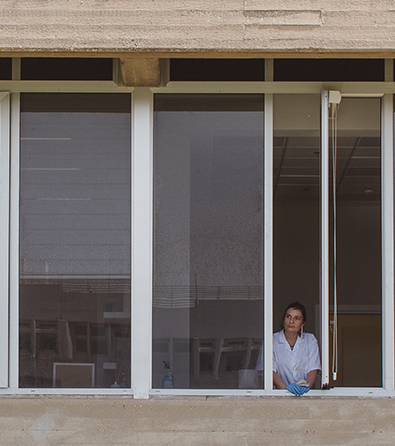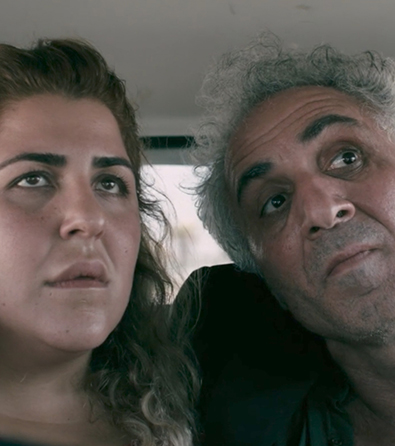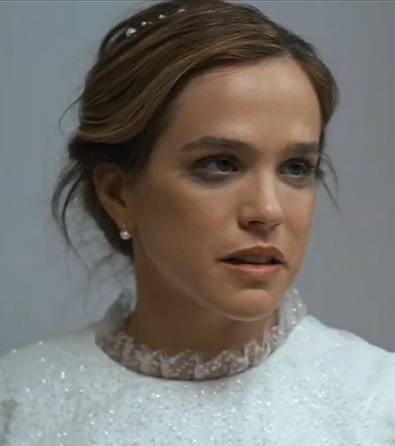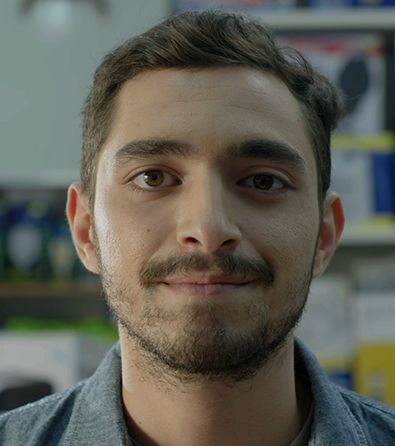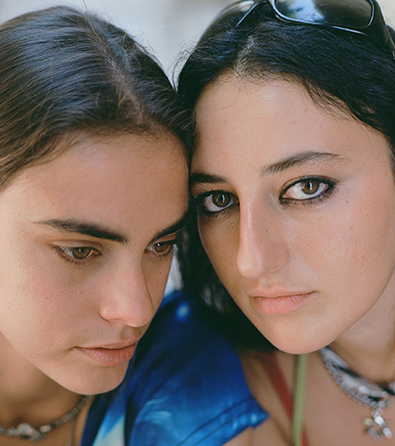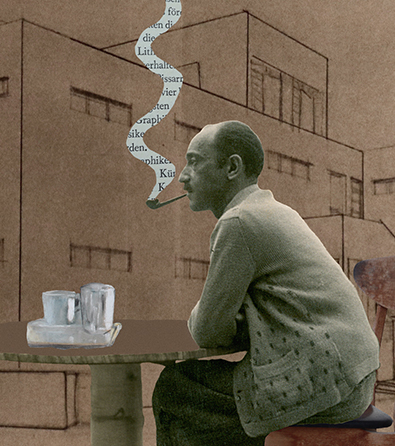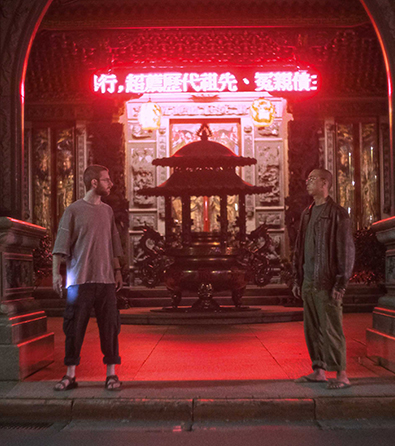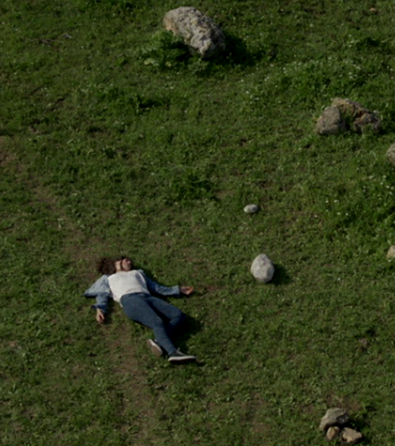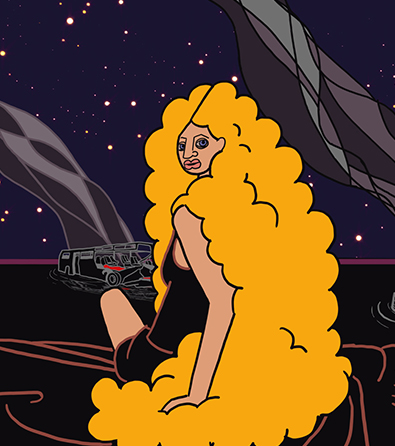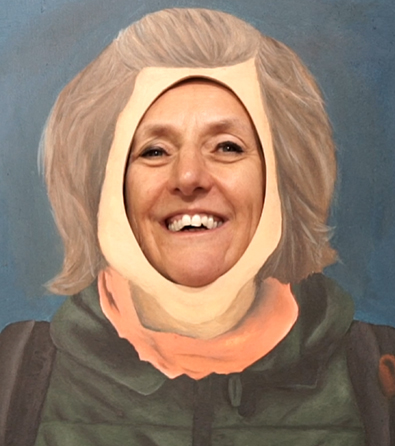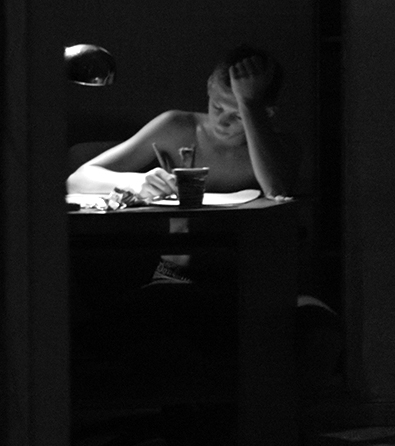The short film Aya (40 minutes) is available at the top of the page.
* To watch this film, please approve YouTube/Vimeo cookies via the blue cookie icon at the bottom left of the screen.
The short film Aya, directed by the award-winning duo Mihal Brezis and Oded Binnun, opens with a prolonged camera movement drifting through a cluster of balloons that have floated upward and come to rest against the ceiling of the arrivals hall at Ben Gurion Airport. This whimsical yet melancholic image, which sets the tone for what follows, gradually emerges as a central and resonant symbol. By the end of the film, it is hard not to recall it in a new light: Aya, the protagonist, returns to her familiar, ordinary life, halted by her own glass ceiling and brought back down to the reality she had briefly escaped. Her playful and exhilarating masquerade ends as she reenters the rhythms of home and daily routine—details that are disclosed only in the film’s closing moments, casting retrospective clarity on earlier events and imbuing the story with added emotional depth.
One of the most poignant and optimistic aspects of the film’s resolution lies in Aya’s decision not to break through her limitations, but to test their edges. Her choice carries an existential tone that explores how we navigate the complex structures of everyday life—its habits, boundaries, missed opportunities, and longings.
Brezis and Binnun have collaborated as a creative duo since their days as film students in the early 2000s. They are behind some of the most compelling short films to emerge from Israeli cinema, including the student film Sabbath Entertainment (2004) and the independent short Lost Paradise (2009). Their sustained dedication to short-form storytelling beyond their academic years is a rare and noteworthy path within the Israeli film landscape, where few filmmakers have pursued the short film medium with such consistency. Particularly notable is the involvement of Tom Shoval, also a graduate of the Sam Spiegel Film and Television School, who co-wrote the screenplay for Aya alongside Brezis and Binnun. Like them, Shoval has continued to cultivate a consistent body of short films since completing his studies.
In 2018, Brezis and Binnun directed their first feature film, The Etruscan Smile, produced by Academy Award-winner Arthur Cohn and starring acclaimed actors Brian Cox and Rosanna Arquette. They are currently working on their second feature.
Aya was nominated for the Academy Award for Best Live Action Short Film and was even screened commercially in select cinemas across Israel—an exceptionally rare achievement for a short film with a 40-minute runtime. These achievements, coupled with critical acclaim in Israel and abroad, speak to the film’s artistic merit and its rare ability to captivate audiences and stand as a sophisticated artistic cinematic work.
At the beginning of the film, Aya is waiting in the arrivals hall at the airport. She agrees to a request from a professional driver, who is waiting for a passenger, to hold his sign for a few minutes. But when the passenger—whose name appears on the sign—arrives, Aya makes a sudden decision to impersonate the driver sent to collect him and escorts him to her private car.
Aya and Mr. Overby, a Scandinavian man, drive together to his hotel in Jerusalem. Along the way, a quiet and intimate connection gradually takes shape between them. Aya discloses the truth about her deception only near the end of the film, and shortly thereafter, the audience, too, is offered a brief glimpse into her personal, “real” life—one that exists beyond the role she has momentarily inhabited. Aya’s journey begins with a surprising and impulsive decision to pose as someone else, and it ends in the same spirit. After dropping Mr. Overby off at his hotel and telling him she’ll just go find parking and then come up to meet him, she ultimately chooses not to return—not to continue the fantasy, but to return to her real life. In doing so, Aya herself punctures the bubble of the parallel life she had gradually constructed throughout the film.
Although not a feature-length film, Aya offers a rich and emotionally layered experience—one that few full-length films manage to achieve. Its emotional depth stems from a masterful use of cinematic language. From the precise screenplay to the understated, intelligent cinematography, every element works in harmony to tell a story that is modest in scale yet profound in impact, much of which unfolds within the confined space of a moving car.
In this context, it is particularly intriguing to consider how Aya operates as a road movie—one in which the characters undergo both an emotional and physical journey—despite the film offering only fleeting glimpses of the landscape through which they travel. This absence is striking, as the visual presence of the environment is typically a defining feature of the road movie genre. Few films have succeeded in charting such a fully realized emotional arc through a journey that unfolds almost entirely within the confines of a single car ride. One of the most iconic cinematic works to achieve something similar—also centered on encounters between strangers—is Taste of Cherry by Iranian filmmaker Abbas Kiarostami. It is tempting to wonder whether Brezis and Binnun drew inspiration from his work while crafting Aya.
The singular encounter between two strangers from entirely different worlds in Aya recalls one of Brezis and Binnun’s earlier works, the short film Lost Paradise. That film centers on a secret love affair between a Muslim woman and an ultra-Orthodox Jewish man who meet in a shabby hotel in Jerusalem.
In both Lost Paradise and Aya, the characters speak in English. The language bridges the linguistic divide, which serves as a symbol for deeper gaps on other levels. Alongside this, both films take place in liminal spaces—threshold environments that represent a state of being “neither here nor there,” physically, geographically, and above all, emotionally. Aya opens in an airport and continues almost entirely within a moving car that rarely comes to a stop, while Lost Paradise unfolds entirely within a hotel room, disconnected from the present, from Israeli reality, and from any concrete sense of time or place—apart from a few visual cues indicating that the room is located in the holy city.
A recurring motif in both short films is the subtle, nuanced way Brezis and Binnun explore the tension between the elevated and the mundane. In Lost Paradise, the shabby hotel room is set in sharp contrast to the sanctity of Jerusalem and the underlying reference to the biblical story of Adam and Eve. In Aya, the refined, European elegance of the well-dressed composer clashes with the protagonist’s directness and distinctly Israeli, down-to-earth perspective.
The film opens with classical music—a motif that recurs later on—but the source is soon revealed to be the hold line of a customer service call Aya is making. When the call disconnects, she mutters a juicy curse. This moment, like many others, exemplifies the film’s clever and humorous approach to the cultural tension between the elevated and the mundane, gradually dismantling—or weaving together—these opposing elements with intelligence and subtle wit.
In forty minutes of minimalist, understated cinema, Aya takes shape as a moving and heartfelt creation—profoundly humane and universal in its resonance. It explores the space between fantasy and daily life, between dreams and routine.

